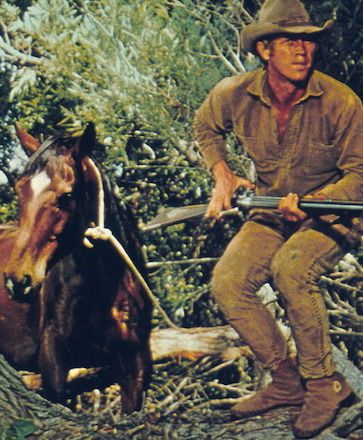Friday, July 15, 1966
NEVADA SMITH. Written by John Michael Hayes, based on the 1961 novel The Carpetbaggers by Harold Robbins. Music by Alfred Newman. Directed by Henry Hathaway. Running time: 131 minutes.
NEVADA SMITH PROBABLY WOULD have merited no better distribution than as the bottom half of a double feature, were it not for the fact that its central character figured largely in Harold Robbins’s "big, bold novel" The Carpetbaggers.
Robbins, America's best-selling pornograph recording star, created in Smith a great gland of a man driven by insatiable appetites — ever present was an immediate hunger for women and a long-term thirst after vengeance.
His life was one of pursuit, and its story formed the most brutal and prurient subplot of the 1961 best-seller.
John Michael Hayes’s script has eliminated or rewritten every one of Robbins's carefully contrived, shock-inducing scenes of vulgarity, sadism and eroticism. Without such supports the author's tale collapses in upon itself, a Pablum-thin, substandard western.
Major contributor to the whole whitewash job is Steve McQueen in the title role. His James Stewart-style Smith is, as tradition demands, far luckier than he is bright, and "aw shucks" diffident to all of the irritatingly apple-cheeked cute girls who cross his haphazard path.
Nevada Smith, the film and the man, is a tragedy. As he rides off into the sunset, alone, friendless and with a price on his head, the pathos of the uncommunicative, heroic renegade comes fully home to us.
He has failed even to develop a meaningful relationship with his horse.
The above is a restored version of a Toronto Varsity review by Michael Walsh originally published in 1966. For additional information on this archived material, please visit my FAQ.
Afterword: Apologies are in order. Describing Harold Robbins as “America's best-selling pornograph recording star” was definitely a linguistic misfire, a failed attempt at wit from a college kid — theVarsity was the University of Toronto's campus newspaper — not quite ready for critical prime time. And now, 56 years on, we’re living in a time when the word “phonograph” is hardly used at all, and anyone with an Internet connection can turn his computer into a “pornograph.” Word play, of course, remains a consistent reminder of what a wonderful toy language can be.
The above brief review is also a reminder of how familiar 1960s college students were expected to be with Robbins, and his most famous work. A roman á clef supposedly based on the life of billionaire Howard Hughes, The Carpetbaggers introduced Max Sand (a.k.a. Nevada Smith) as the main character’s surrogate father, a man with a past in the 1890s American West. Smith’s origin story was told in the 1966 feature, among the last Westerns directed by legendary filmmaker Henry Hathaway.
Both Robbins and the picture’s star Steve McQueen were at the height of their popularity back then. In a 2019 Hollywood Reporter feature headlined “Revisiting Harold Robbins, the Forgotten ‘Dirty Old Man of American Letters’,” Michael Callahan recalls that the actor “starred in two Robbins adaptations, 1958’s Never Love a Stranger (as a blond Jew, no less) and 1966’s Nevada Smith (as a blond half-breed, no less).” Though McQueen was for a time the world’s highest-paid film star, Callahan’s remark was less a tribute to the blond actor’s versatility than Hollywood’s indifference to authenticity when casting mega-budget movies.
While we’re on the subject of fleeting fame, we’ve reached the point when, on hearing the name Steve McQueen, the current generation of filmgoers are as likely to picture the London-born director of 12 Years a Slave. The English McQueen's historical drama won the 2013 Best Picture Academy Award. In 2020, he was knighted by Her Majesty Elizabeth II “for services to film.” Sir Steve is not a blond.
Robbins nest: Included in today’s Reeling Back package are director Henry Hathaway’s 1966 Western epic Nevada Smith; Lewis Gilbert’s 1970 action thriller The Adventurers; and Peter Sasdy’s 1983 tale of film industry ambition,The Lonely Lady. Already posted to the archive is Daniel Petrie’s 1978 adaptation of the big bold novelist’s The Betsy.
